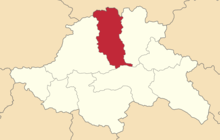Dusheti uezd
Dusheti uezd
Душетскій уѣздъ | |
|---|---|
 Location in the Tiflis Governorate | |
| Country | Russian Empire |
| Viceroyalty | Caucasus |
| Governorate | Tiflis |
| Established | 1802 |
| Abolished | 1929 |
| Capital | Dushet (present-day Dusheti) |
| Area | |
| • Total | 3,882.84 km2 (1,499.17 sq mi) |
| Population (1916) | |
| • Total | 66,430 |
| • Density | 17/km2 (44/sq mi) |
| • Urban | 3.37% |
| • Rural | 96.63% |
The Dusheti uezd[a] was a county (uezd) of the Tiflis Governorate of the Caucasus Viceroyalty of the Russian Empire, and then of Democratic Republic of Georgia, with its administrative centre in Dushet (present-day Dusheti).[1] The area of the uezd roughly corresponded to the contemporary Mtskheta-Mtianeti region of Georgia.
History
[edit]Following the Russian Revolution, the Dusheti uezd was incorporated into the short-lived Democratic Republic of Georgia.[1]
Administrative divisions
[edit]The subcounties (uchastoks) of the Dusheti uezd in 1913 were as follows:[2]
| Name | 1912 population | Area |
|---|---|---|
| Bazaletskiy uchastok (Базалетскій участокъ) | 14,812 | 579.02 square versts (658.96 km2; 254.43 sq mi) |
| Kvishetskiy uchastok (Квишетскій участокъ) | 22,882 | 1,518.08 square versts (1,727.67 km2; 667.06 sq mi) |
| Ksanskiy uchastok (Ксанскій участокъ) | 14,732 | 800.15 square versts (910.62 km2; 351.59 sq mi) |
| Mtskhetskiy uchastok (Мцхетскій участокъ) | 15,930 | 514.55 square versts (585.59 km2; 226.10 sq mi) |
Demographics
[edit]Russian Empire Census
[edit]According to the Russian Empire Census, the Dusheti uezd had a population of 67,719 on 28 January [O.S. 15 January] 1897, including 35,848 men and 31,871 women. The majority of the population indicated Georgian to be their mother tongue, with a significant Ossetian speaking minority.[3]
| Language | Native speakers | % |
|---|---|---|
| Georgian | 49,690 | 73.38 |
| Ossetian | 14,523 | 21.45 |
| Armenian | 1,680 | 2.48 |
| Russian | 980 | 1.45 |
| Tatar[b] | 405 | 0.60 |
| Assyrian | 121 | 0.18 |
| Mingrelian | 54 | 0.08 |
| Ukrainian | 53 | 0.08 |
| Polish | 43 | 0.06 |
| Jewish | 24 | 0.04 |
| Avar-Andean | 17 | 0.03 |
| Persian | 15 | 0.02 |
| Imeretian | 14 | 0.02 |
| German | 13 | 0.02 |
| Kyurin | 10 | 0.01 |
| Greek | 8 | 0.01 |
| Dargin | 7 | 0.01 |
| Lithuanian | 4 | 0.01 |
| Kurdish | 3 | 0.00 |
| Belarusian | 2 | 0.00 |
| Chechen | 2 | 0.00 |
| Kazi-Kumukh | 2 | 0.00 |
| Romanian | 1 | 0.00 |
| Chuvash | 1 | 0.00 |
| Other | 47 | 0.07 |
| TOTAL | 67,719 | 100.00 |
Kavkazskiy kalendar
[edit]According to the 1917 publication of Kavkazskiy kalendar, the Dusheti uezd had a population of 66,430 on 14 January [O.S. 1 January] 1916, including 32,949 men and 33,481 women, 65,737 of whom were the permanent population, and 693 were temporary residents:[6]
| Nationality | Urban | Rural | TOTAL | |||
|---|---|---|---|---|---|---|
| Number | % | Number | % | Number | % | |
| Georgians | 1,165 | 52.08 | 56,430 | 87.91 | 57,595 | 86.70 |
| North Caucasians | 5 | 0.22 | 4,614 | 7.19 | 4,619 | 6.95 |
| Armenians | 998 | 44.61 | 2,673 | 4.16 | 3,671 | 5.53 |
| Russians | 52 | 2.32 | 218 | 0.34 | 270 | 0.41 |
| Other Europeans | 16 | 0.72 | 109 | 0.17 | 125 | 0.19 |
| Shia Muslims[c] | 0 | 0.00 | 61 | 0.10 | 61 | 0.09 |
| Jews | 1 | 0.04 | 59 | 0.09 | 60 | 0.09 |
| Sunni Muslims[d] | 0 | 0.00 | 29 | 0.05 | 29 | 0.04 |
| TOTAL | 2,237 | 100.00 | 64,193 | 100.00 | 66,430 | 100.00 |
See also
[edit]Notes
[edit]- ^
- ^ Before 1918, Azerbaijanis were generally known as "Tatars". This term, employed by the Russians, referred to Turkic-speaking Muslims of the South Caucasus. After 1918, with the establishment of the Azerbaijan Democratic Republic and "especially during the Soviet era", the Tatar group identified itself as "Azerbaijani".[4][5]
- ^ Primarily Tatars.[7]
- ^ Primarily Turco-Tatars.[7]
References
[edit]- ^ a b Tsutsiev 2014.
- ^ Кавказский календарь на 1913 год, pp. 164–175.
- ^ a b "Демоскоп Weekly - Приложение. Справочник статистических показателей". www.demoscope.ru. Retrieved 2022-06-30.
- ^ Bournoutian 2018, p. 35 (note 25).
- ^ Tsutsiev 2014, p. 50.
- ^ Кавказский календарь на 1917 год, pp. 206–213.
- ^ a b Hovannisian 1971, p. 67.
Bibliography
[edit]- Bournoutian, George A. (2018). Armenia and Imperial Decline: The Yerevan Province, 1900–1914. Milton Park, Abingdon, Oxon: Routledge. ISBN 978-1-351-06260-2. OCLC 1037283914.
- Hovannisian, Richard G. (1971). The Republic of Armenia: The First Year, 1918–1919. Vol. 1. Berkeley: University of California Press. ISBN 978-0520019843.
- Кавказский календарь на 1913 год [Caucasian calendar for 1913] (in Russian) (68th ed.). Tiflis: Tipografiya kantselyarii Ye.I.V. na Kavkaze, kazenny dom. 1913. Archived from the original on 19 April 2022.
- Кавказский календарь на 1917 год [Caucasian calendar for 1917] (in Russian) (72nd ed.). Tiflis: Tipografiya kantselyarii Ye.I.V. na Kavkaze, kazenny dom. 1917. Archived from the original on 4 November 2021.
- Tsutsiev, Arthur (2014). Atlas of the Ethno-Political History of the Caucasus (PDF). Translated by Nora Seligman Favorov. New Haven: Yale University Press. ISBN 9780300153088. Archived (PDF) from the original on 17 June 2023.

